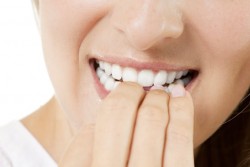The Habit that Bites
Stop nail biting with a few simple tips.
 Nail biting can run the spectrum from a delicate nibble on a jagged cuticle edge to a voracious near-need to bite off all the nails, also known as “pathological grooming.”
Nail biting can run the spectrum from a delicate nibble on a jagged cuticle edge to a voracious near-need to bite off all the nails, also known as “pathological grooming.”
Regardless of how extreme your habit might be, if you want to put your best hand forward, here are four good reasons to cease the chomping today:
1. Salmonella, E. coli and other bacteria love to set up camp in the tips and underside of your nails. Tears in your skin around your nails leave you susceptible to germs entering the skin. Put that together with the fact that you’re using your mouth to bite your nails and, well, gross!
2. Nail biters have been shown to be more likely to have warts on their hands. See above about using your mouth and how unsavory that can be. (Warts can actually spread to your mouth.)
3. The last thing your teeth need is the pushing and pulling involved with nail biting. It weakens roots and can shift your bite causing crooked teeth.
4. Nail biters can project a lack of confidence. Whether you bite in public or behind closed doors, having raggedy nails gives the appearance of anxiety.
Beauty experts say to start with a good manicure to set you on the road to less biting. Buff Beauty Bar (720 Carondelet St., (504) 522-2833) in the Warehouse District and Lilly’s Nails & Spa (1817 Magazine St., (504) 522-9909) in the Garden District are top-rated locations to have your nails treated in New Orleans. Multiple coats of nail polish, even done at home, are a good psychological strategy — you’ll be less likely to bite after all that work.
If you still find yourself picking and pecking, there are multiple products on the market that work well to deter the habit. Amazon.com patrons seem to favor Onyx Professional Stop the Bite polish as well as Nailactin Nutritive Nail Crème or even O’Keefe’s Working Hands to help with the dry areas around the nails.
For true addicts, there are some steps you can take to help break the habit once and for all.
1. Stop. Set the date and stop cold turkey.
2. Notice your triggers. Stress? Boredom? Hunger? Walk away if you can, find an alternative if you can’t.
3. Condition your behavior. Use Post-it notes to remind yourself not to bite. Come up with a mantra to tell yourself if you catch yourself in the act. Wear a rubber band around your wrist and give it a hard snap to break the spell. Tie a string around your finger and remember — don’t bite.
4. Enlist help. Ask those around you to remind you to stop if they catch you biting.
5. Treat the causes. A therapist or social worker might help.
Recently, the American Psychiatric Association put pathological grooming in the same category as another habitual behavior, obsessive compulsive disorder. And research has even shown that the trait can be genetic just like OCD. The good news is that while OCD usually causes anxiety, biting your nails actually tends to feel rewarding. The bad news is, the visible remains of your nail biting habit might be driving you (and the people around you) nuts.
